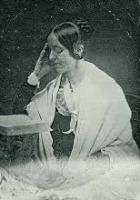Sarah Margaret Fuller
Sarah Margaret Fuller Poems
My love gave me a passion-flower.
I nursed it well - so brief its hour!
...
'A maiden sat beneath a tree;
Tear-bedewed her pale cheeks be,
And she sigheth heavily.
...
The clouds are marshalling across the sky,
Leaving their deepest tints upon yon range
Of soul-alluring hills. The breeze comes softly,
...
Saw ye first, arrayed in mist and cloud;
No cheerful lights softened your aspect bold;
A sullen gray, or green, more grave and cold,
...
There are who separate the eternal light
In forms of man and woman, day and night;
They cannot bear that God be essence quite.
...
Sarah Margaret Fuller Biography
Sarah Margaret Fuller Ossoli, commonly known as Margaret Fuller, (May 23, 1810 – July 19, 1850) was an American journalist, critic, and women's rights advocate associated with the American transcendentalism movement. She was the first full-time female book reviewer in journalism. Her book Woman in the Nineteenth Century is considered the first major feminist work in the United States. Born Sarah Margaret Fuller in Cambridge, Massachusetts, she was given a substantial early education by her father, Timothy Fuller. She later had more formal schooling and became a teacher before, in 1839, she began overseeing what she called "conversations": discussions among women meant to compensate for their lack of access to higher education. She became the first editor of the transcendentalist journal The Dial in 1840, before joining the staff of the New York Tribune under Horace Greeley in 1844. By the time she was in her 30s, Fuller had earned a reputation as the best-read person in New England, male or female, and became the first woman allowed to use the library at Harvard College. Her seminal work, Woman in the Nineteenth Century, was published in 1845. A year later, she was sent to Europe for the Tribune as its first female correspondent. She soon became involved with the revolution in Italy and allied herself with Giuseppe Mazzini. She had a relationship with Giovanni Ossoli, with whom she had a child. All three members of the family died in a shipwreck off Fire Island, New York, as they were traveling to the United States in 1850. Fuller's body was never recovered. Fuller was an advocate of women's rights and, in particular, women's education and the right to employment. She also encouraged many other reforms in society, including prison reform and the emancipation of slaves in the United States. Many other advocates for women's rights and feminism, including Susan B. Anthony, cite Fuller as a source of inspiration. Many of her contemporaries, however, were not supportive, including her former friend Harriet Martineau. She said that Fuller was a talker rather than an activist. Shortly after Fuller's death, her importance faded; the editors who prepared her letters to be published, believing her fame would be short-lived, were not concerned about accuracy and censored or altered much of her work before publication.)
The Best Poem Of Sarah Margaret Fuller
The Passion Flower
My love gave me a passion-flower.
I nursed it well - so brief its hour!
My eyelids ache, my throat is dry:
He told me that it would not die.
My love and I are one, and yet
Full oft my cheeks with tears are wet -
So sweet the night is and the bower!
My love gave me a passion-flower.
So sweet! Hold fast my hands. Can God
Make all this joy revert to sod,
And leave to me but this for dower -
My love gave me a passion-flower.

WHAT DOES FLAXMAN MEAN IVE BEEN STRUGGLING FOR HOURS WITH IT